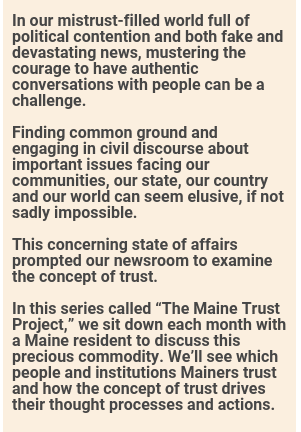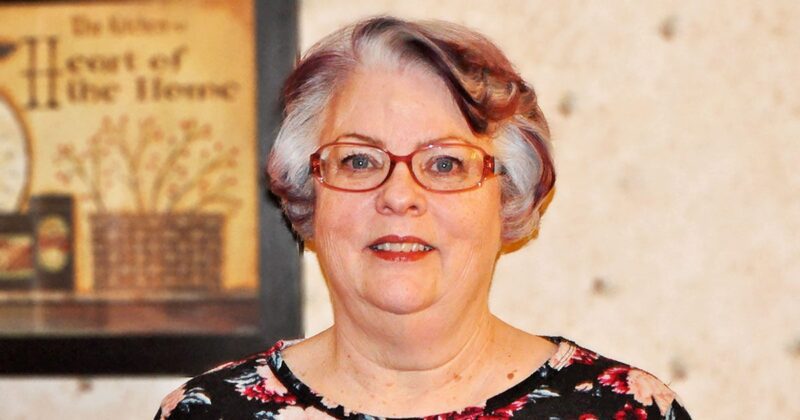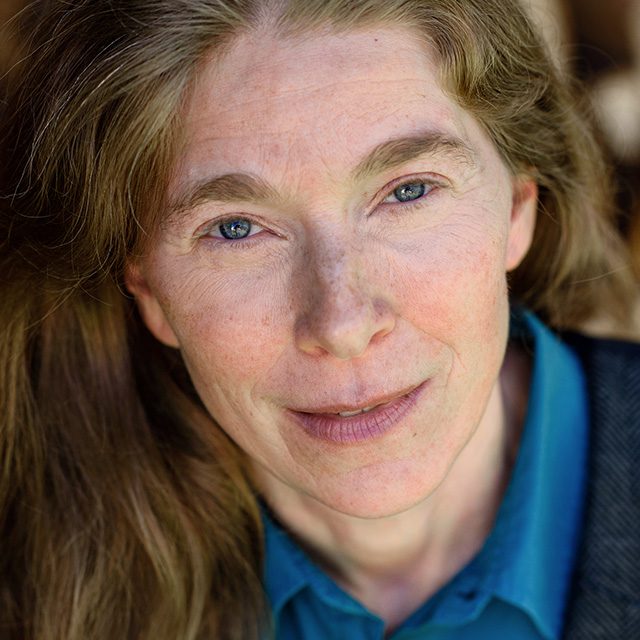Dona Emerson picks up hitchhikers.
Most people, especially women, have been schooled in the dangers of giving strangers a ride, and Dona was no exception. “My (85-year-old) mother,” she said, “would kill me if she knew how many I’ve picked up.”
And yet, she still does it.
 Why? Because Dona Emerson understands the importance of reaching out to people to create connections, and she values the role of trust in that endeavor.
Why? Because Dona Emerson understands the importance of reaching out to people to create connections, and she values the role of trust in that endeavor.
The youngest of three, Dona was raised near Fitzsimons Army Medical Center in Aurora, Colo., the state’s third most-populous city. With her father a minister for the Community of Christ, church — and the medical center — were her life.
She often joined her World War II veteran dad at the hospital when he ministered to patients and their families, some of whom were experiencing the worst moments, and even the last moments, of their lives.
Her father would become violently ill before heading to the hospital, struggling with the weight of how to give those burdened people what they needed in the moment. It was at his side that she learned about trust. “Trust,” she said, “revolves a lot around God, but more than that, it revolves around giving my trust to receive your trust.”
With that personal credo, it is no wonder that not only does Dona give rides to strangers, she even gives them a place to stay in her home.
Washington County, where she and her husband Art live – they’re both pastors for the Community of Christ – gets an annual influx of Latin American migrants who work on the area’s blueberry farms. They often arrive with little or no money and little or no English skills. Some don’t have a place to stay when they first land in Maine’s blueberry country, and that’s where Dona and Art step in.
“People think we’re crazy, (but) we do this all the time,” she said.
Some of the strangers they’ve given respite to have become good friends. One such man was a recovering alcoholic and on parole – bits of information they learned only after he arrived at their home for the night. One night turned into a week. Dona made and packed him lunches and fed him dinner every evening.
“I try to trust other people first, sight unseen,” she said. “I make every attempt to be there when people need me. I think that’s important. I think it’s far too easy to sit in your chair and say ‘I’ll go to the hospital tomorrow and see him.’ I can’t live there.”
Q&A
Who meets your definition of trust and how do they meet it?
Dona: I trust my husband (of 33 years), Art. It took me a while to get there, though. I had been married before, but he left. I was crushed. I was crushed. So, it took me a long time to trust that Art would stay with me. I wasn’t prepared to trust because I had been so wounded, and even though I knew this is what I really thought God wanted, there was still this piece that was so wounded and hurt and broken I couldn’t fully trust. But Art was willing to take me that way. He trusted that eventually he would win me over, and he did.
And I trust my husband almost in a biblical sense as well. There is Scripture — and I use it quite often in weddings, and a lot of people do, but they don’t use the double Scripture. It’s a pairing of Scriptures. It’s the one about ‘wives obey your husbands,’ blah blah blah. But the companion Scripture’s the one that often gets ignored. The one which is for the husbands to treat their wives as Christ treated the church. When you take those in conjunction with each other, that makes trust. When decisions need to be made, Art trusts that I trust him to know what is best. I can yammer to my husband and can explain myself and say, ‘But I think ….’ In the end, he’s the one that’s going to make the decisions.
But I trust him to have listened to me. I trust him that he’s paid enough attention that he really understands what I’m trying to say. I trust him knowing that he would never put me in jeopardy. He would never want to embarrass me or cause me harm or ruin my reputation. That’s trust.
Who doesn’t meet your definition and how do they fail to meet it?
Dona: Politicians. I don’t like to talk about politics. It’s not my thing because I think it can be misused. For instance, many people talk politics from the pulpit. They use their influence to sway people to their cause. I have had my congregations over the years ask me who I’m voting for. I won’t tell them. It’s wonderful that they trust me so much, but it’s heart-wrenching that they either don’t want to find out for themselves or chose not to pray about it for themselves or even just listen to those around them and come to what truth they can find. So, I don’t do politics very much, but I think far too often our politicians betray the public trust. Far too often, they do what’s good for them when they’re in office. The public good is not being served by our politicians. There’s too much ‘what’s in it for me.’
This is just my opinion, but I’ll throw it out there: If you shut down the government, how come you’re getting paid? We have a Coast Guard station in Jonesport. They’re still patrolling but not getting paid. Politicians are not serving the public good. They’re serving themselves. They should be focused with a hawk-like vision on what’s critical for America, but they’re not doing their job. So, they’ve broken the trust. It’s to the point you’re constantly voting for the lesser of two evils. It’s no wonder Trump won. He’s a breath of fresh air. I do not love his verbiage. I do not love some of the antics that he pulls. And please, somebody, pull his Twitter account. But I know why people voted for him. They voted for him because they felt they had a chance. They felt there was hope. There hasn’t been hope for a long time.
What breaks trust for you?
Dona: Deception. And when people become self-serving. Being self-serving means you only care about yourself, and that breaks trust. When you care only about yourself, you don’t care about the things that are important: about relationships and community, about belief and the continuity of family. You’re all in it for you, and that breaks trust.
Can broken trust be healed?
Dona: Yes. Every time. With honesty and sincerity. It never has to be a grand gesture. It just has to be an honest and true one.
Has your definition of trust changed over the years, and if so, how?
Dona: Oh gosh, yes. My husband used to say I was a very black-and-white person. I’ve had to learn about gray. It used to be if somebody came to me at church and said, ‘My lights are going to be shut off. I’m in such trouble,’ I’d take money from petty cash and give it to them, completely trusting them. And then I had someone tell me that a person I gave money to pay the electric bill bought drugs with the money. Now if someone needs a light bill paid, I call the electric company and pay the bill that way. I have to have conditional trust. I still need to help people because that trust has been placed in me. However, I need to help them, not enable them. That’s a huge difference.
Do you think the cultural definition of trust has changed, and if so, how?
Dona: Yes. When I was growing up, trust was given freely. People’s word meant something. It had a tangible value almost. They used to say ‘my word is my bond.’ That almost doesn’t exist now, because everything now is temporary. Everything is disposable: relationships, families, children.
What worries you?
Dona: I worry that our country is on a track — not just governmentally but community-wise — on a track that is leading to real issues and problems that we’re not going to be able to solve.
I’m also worried about this socialism that’s coming up. There is a danger in people being given too much: Where they have no pride in their own accomplishment; no motivation to be better and do better. Not to have more — there’s a big difference there — but to be more. People have lost that desire.
I’m sorry to say that we’re jaded in America, and that worries me. When you have a president who is sleeping with an intern whose barely in her 20s and denies it publicly and lies to the American public — flat out — and not much of anything happens. And if any person at any corporation had a server in their own home then wiped it of a bazillion emails — I think their tail would have been in jail. But because of privilege in America, there is no justice.
When you have a president who speaks atrocities, who can sometimes be a misogynist — and for the record, I don’t think he’s really a misogynist — I just think he’s dumb sometimes. I really don’t think he thinks of women as less. He was just raised in such a way that his mouth was indulged and he’s just not learned to curb it. I appreciate the ‘let-me-tell-you-how-it-is,’ but does he have to say things to Megyn Kelly about her monthly cycles? That is so far beyond good taste. So, those things scare me. The government overall scares me because I just think there’s just too much privilege. There’s not enough justice. There’s not enough equality, trust, and again, serving the common person.
What inspires you?
Dona: The resurgence of patriotism in America. That inspires me. God inspires me. Children who are learning to be leaders and who are inspired to do better and to be more.
What issues do you think are important today?
Dona: I’m wicked concerned about ISIS. It’s not over. I’m very concerned by countries like Belgium that have allowed so many refugees in and now have been overtaken by gangs. They’re getting murdered in their own neighborhoods because they’ve allowed so much open border.
We’re talking about putting in a southern border wall. I’m not saying we can construct a wall everywhere, but we do have to have some kind of border security. We have to have a sovereign border. We have to have a way to do what needs to be done.
Immigration is a complex issue. It’s hard for me. I’m a Latino pastor. I learned a language to help these people. I’ve provided sanctuary in my home, helped immigrants get their work permits and green cards when it’s appropriate, even to become citizens. But I know this country cannot support all of these people with welfare, with schooling and English as a second language. I’m not trying to be hardhearted. Somehow, we have to work together to do this because we can’t just keep taking people. Not because we don’t have room, but because our economy cannot hold it right now.
Get to know Dona Emerson
Age: 62
Residence: Addison
Religious affiliation: Community of Christ (formerly known as the Reorganized Church of Jesus Christ of Latter Day Saints)
Political affiliation: I’m registered as a Republican, but I don’t vote tickets. I vote on individuals.
How she describes herself: I’m strange, I’m weird, and I have a good time. I’m a happy person who loves to play music, sing and dance. I’m a real firm believer in joy and laughter, and I don’t believe church should be painful.
How she defines trust: Trust is a great intangible. It has many definitions. It is a compact. It is a promise. It is a sacred honor.




